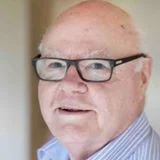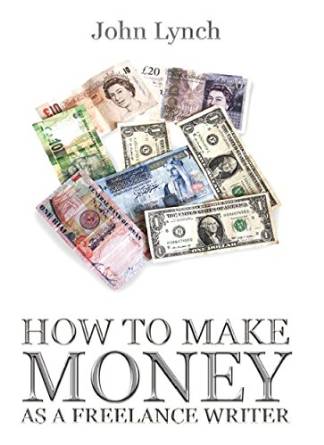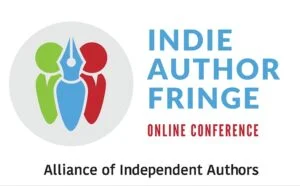
John Lynch, indie author and freelance writer
No matter how your books are published, whether self-published or by a traditional publishing company, only a small minority of authors are able to earn their keep simply by writing fiction. While many stick with their day jobs to supplement the income from their books, diversifying into other forms of writing is common – a huge proportion of ALLi fiction authors have also written books about writing and self-publishing for example. Today John Lynch makes the case for a different and potentially much more lucrative sideline: freelance writing, based on his own impressive experience. Over to John…
Why Aren’t You Freelancing?
It’s very difficult to make a living wage as a writer of fiction. A woman said in a recent Guardian piece that she had received a £5,000 advance on a novel that had taken her two years to write and she knew she’d never receive any more for it, but she wouldn’t consider self-publishing because it would not allow her “to make a living as a writer.” £5,000 is a living?
Let’s be charitable and assume that she wanted to preserve her street cred in order to hold onto her coaching gigs and somehow imagined that having enough sense to abandon the broken model that is traditional publishing would damage her image. Wrong, of course, but we all know there are far more walking around than ever get locked up.
The reality is that only a tiny minority of authors – self-published or traditionally published – earn enough from fiction to cover their bills.
And yet, I encounter few who admit to freelancing. Whether this is because they don’t do it or because they’re ashamed to admit that they do I have no idea. If it’s the second, the shame is misplaced. And if it’s the first, then why the hell not?
There's Serious Money to be Made in Freelancing

John Lynch provides valuable detailed advice about successful freelance writing in this new guidebook
A lot of people will tell you that there’s no money in freelancing, and it simply isn’t true. I understand where the idea comes from. Writing for the Internet, whether websites or blog posts, is a huge market, and a great deal of what you’ll find there is rubbish. It’s written by people whose first language is not English or by people who can’t write or by people who suffer from both defects.
But we are now seeing the same “onshoring” effect that we saw a while ago with Help Desks.
I know marketing companies who outsourced all their copywriting to the Indian subcontinent to save money. Now they’re bringing it back – because what’s the point of saving money if you’ve lost all your customers?
So – whatever people tell you – you don’t have to write for a penny a word. In fact, you shouldn’t. In fact – for the sake of the rest of us – you MUST NOT.
Why Freelance Writing Is Good For Creative Writers
Creative writers make good freelancers because most stuff on the web is a “me-too”. Something just like it has appeared a hundred, a thousand or a million times before. Clients are crying out for something different – a hook that hasn’t been tried before and will grab the reader’s attention – and creative writers are good at that. And freelancing is good for creative writers (as long as you don’t fill every minute of every day with it) because it builds steady work habits. You have to sit down at the keyboard, and you have to start writing, and that’s all there is to it.
My freelancing career began in 1989 when I sold Good Housekeeping Magazine a piece on how to deal with direct sales people. That coincided with the moment I published my first book (with a traditional publisher; there wasn’t so much self-publishing then). On the back of those two events, I spent four years as a writer for hire, turning out full-length books, video scripts, training scripts, advertising copy. You name it, I wrote it. When the contract came to an end, I went back into international sales, but I never stopped freelancing entirely, just as I never stopped writing fiction.
How I Achieved My Ambitious Target
When I retired from international sales last May, I started freelancing again. I didn’t want to be so busy writing for other people that I’d have no time to write novels so I set a target: freelance for three hours a day, seven days a week for not less than £2,000 a month. I hit the target in month two and haven’t missed it since. If I wanted to, I could be freelancing 24/7. That’s how much business there is. Want some?
You need two things:
- You must be an accomplished writer with a good grasp of English style, grammar and sentence construction; and
- You must be prepared to work hard and always meet your deadlines.
As long as you have both of those things, you can make a go of it.
So why aren't you freelancing?
- John Lynch has written a short, punchy book sharing his experience and advice in more detail. How To Make Money As A Freelance Writer is now available on Kindle and the paperback is carried by Gardner’s so you can order it from your local bookshop – or you can buy it from my website, post free.
- John Lynch was also a contributor on the top to our recent free online self-publishing conference: BEA IAF16. Click here to read his conference post, containing practical tips on launching and sustaining a lucrative freelancing career.
RELATED POSTS
- Why Indie Authors Need to Talk about Selling – by John Lynch
- Why You Should Run Your Writing Career Like a Business – by David Penny
- No, Crowdfunding is not Begging – by Orna Ross
 Catch Up with the Conference
Catch Up with the Conference
This is the first in an occasional series of posts drawing on the best advice and guidance offered within ALLi's recent IAF (Indie Author Fringe) – the premier festival for self-published authors. The content from both the London Book Fair IAF16 and the Book Expo America IAF16 are still available to view in our archive – so if you've not yet caught up with that vast stash of fabulous material, you can do so now!




[…] Writing: How to Supplement Your Book Earnings with Freelance Writing […]
[…] Writing: How to Supplement Your Book Earnings with Freelance Writing […]
[…] Writing: How to Supplement Your Book Earnings with Freelance Writing […]
I’ve been giving a lot of thought to freelancing but there’s so much competition, especially from writers who are cheaper than you. So yes, you need to work hard, and be able to write well, but you also need to build a portfolio which might require you to work for free when you first start out.
From the moment I wrote my first western romance eBook in 2011 I have never worried or lost a minute of sleep over whether I would one day get a $5,000 advance on a book I wrote.
I am a optimistic/pessimist. I am hopeful one of my books will one day bring in a decent amount of money but I am also a realist.
I am disabled, have had two head injuries, do not excel in English grammar and cannot afford a manuscript editing service. Not only that but I know how hard it is for a publisher to take on an unknown author, invest a fortune to distribute his book in bookstores and hope it will be a success.
Am I a disgruntled, discouraged or unhappy author.
Not by a long shot.
I have edited and edited and edited my 24 eBooks trying to make them the best they can be so they are enjoyed by readers.
I will write again in July.
I have learned so much from joining this writers group and know I am a better writer for it.
Their advice about ‘beta readers’ has been instrumental in helping me to make each book a better book.
Do I have far to go to be my best?
Miles, but I am patient and believe in myself.
Hi John,
Yours is a valuable post, and I thank you for it. But I think it’s only fair to add that, in addition to having mastered the language, and being willing to work hard, you’ve had a career as a freelancer that dates back to 1989. You no doubt have a long, impressive track record that will reassure editors you can be relied on to make good on whatever you pitch to them. It’s a useful thing to remember: the newbie freelancer is up against a lot more than people whose English is poor, and who lack ambition.